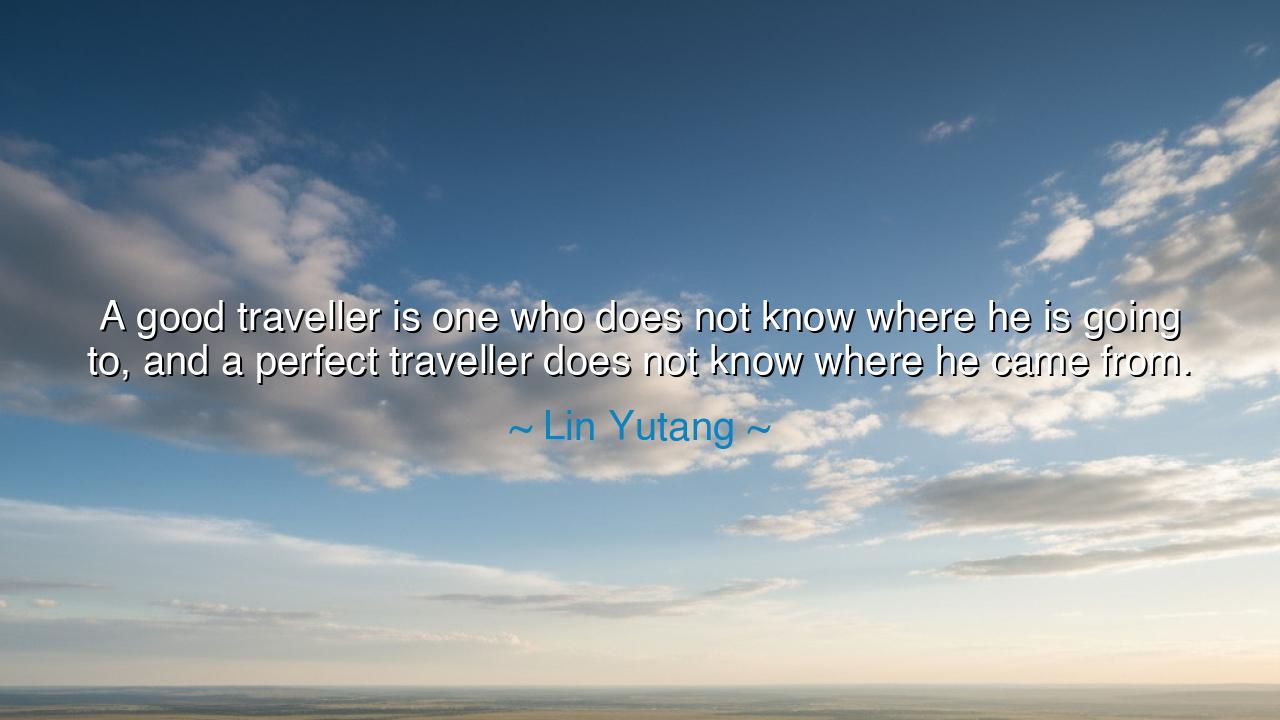
A good traveller is one who does not know where he is going to
A good traveller is one who does not know where he is going to, and a perfect traveller does not know where he came from.






Hear, O wanderer of roads and rivers, the profound words of Lin Yutang: “A good traveller is one who does not know where he is going to, and a perfect traveller does not know where he came from.” At first, these words seem paradoxical, like riddles spoken by sages. Yet within them lies an ancient truth about freedom, detachment, and the essence of the journey itself. For to travel in the highest sense is not merely to move across lands, but to dissolve boundaries within the mind and spirit.
The good traveller is he who does not know where he is going. This does not mean he wanders foolishly without aim, but rather that he is open to discovery, unbound by rigid plans. He moves not toward a fixed destination, but toward revelation. Every road, every turn, every village becomes a gift, for he expects nothing and therefore receives everything. This is the art of surrendering control, of allowing life itself to guide the path. Such a traveler is already wise, for he has learned that the destination is less important than the journey.
But the perfect traveller—he goes further still. He is the one who does not even know where he came from. This is not forgetfulness of birthplace or heritage, but a transcendence of identity and past. He no longer clings to the soil of origin, to the pride of tribe, to the chains of history. In him, there is no “I from here” or “I from there,” but only the vastness of being. He belongs everywhere, and nowhere. Such a one has shed the burden of memory, of self-definition, and moves as freely as the wind. His home is the earth itself, and his companion, the eternal present.
The ancients told stories of such travelers. Consider Laozi, the sage of the Tao, who, weary of the world, mounted his ox and vanished into the western wilderness. No man knows where he was going, nor from whence he came; his teaching survives, but his footsteps are lost. He was the perfect traveller, unbound by past or future, dissolving into the rhythm of the Way. Or recall the wandering ascetics of India, the sannyasins, who left behind family and origin, living rootless, belonging to no place yet embraced by all places. They too embodied Lin Yutang’s vision.
Even in history’s more worldly journeys we find echoes of this wisdom. The great explorer Ibn Battuta left his home in Tangier and traveled for nearly thirty years across Africa, Arabia, India, and China. At some point, he no longer traveled as a Moroccan, nor as a man of one place, but as a citizen of the world. When he finally returned, his homeland seemed foreign to him. He had, in essence, forgotten where he came from, for he had seen so much that the divisions of origin no longer defined him. His heart had grown larger than any map.
O listener, the lesson is clear: to be a good traveller, let go of the need for certainty. Do not demand to know every step before you walk. Allow the unknown to lead you, for in it lies discovery. But to be a perfect traveller, go deeper still—release even the weight of your past. Do not let old wounds, old names, or old boundaries hold you prisoner. Travel not as a representative of one land, but as a soul moving freely through the world, learning, receiving, and becoming.
Practical wisdom follows: when you next travel, resist the urge to overplan. Leave room for wonder, for the accidental path, for the stranger who invites you to share their table. And as you move, seek not to compare all things to your homeland, nor to cling to the pride of where you came from. Instead, listen, observe, and allow the world to write itself upon you anew. In this way, you will taste the freedom of both the good and the perfect traveller.
Thus I say to you: Lin Yutang’s words are a call to liberation. To walk the earth as a traveller is already wisdom. To walk as one who no longer clings to past or future is to walk as one with the universe itself. For then every step becomes home, and every horizon becomes eternity.






AAdministratorAdministrator
Welcome, honored guests. Please leave a comment, we will respond soon